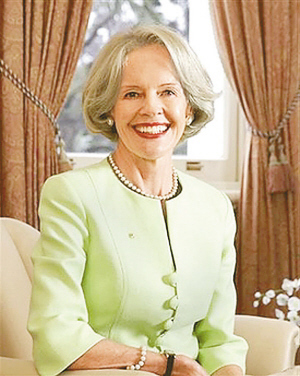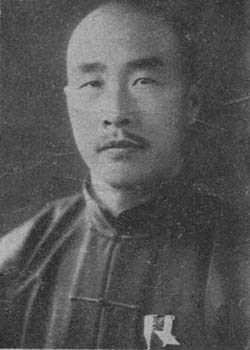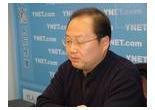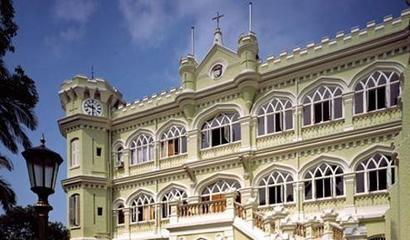Renmin University Vice President YiAmbassador AdamsonAmbassador MaStudents of Renmin University and other universities fromaround the regionDistinguished guestsLadies and gentlemen
I am delighted to be joining you at Renmin University today,here in the heart of Beijing’s leading academic and researchprecinct at Haidian.Renmin University rightly holds a place as one of China’s mosthighly regarded institutions of learning in the humanities andsocial sciences.Among your schools are what many recognise as China’s mostimpressive faculties of law, economics, journalism and sociology,among others.I know that in your magnificent grounds here you have a largerock with that most famous – and in this academic setting,important – of phrases, “seek truth from facts”.And also that not far from there, perhaps Beijing’s mostfamous “English Corner” exists, where there has long been anexchange of languages, ideas and, one imagines, cultures andunderstanding, over many years.So it is no surprise that you have one of China’s most activeand impressive Australian Studies Centres, ably led by ProfessorZhang Yongxian.Professor Zhang himself is a wonderful story of the type ofrelationship China and Australia have built over the last severaldecades.After studying foreign languages in his home province of InnerMongolia, Professor Zhang went to Melbourne in the early 1980s onan Australian Government scholarship.He then joined the Chinese diplomatic corps, and worked in theChinese Embassy in Canberra for a period.He came back to China in 1989 and continued his studies inlanguage teaching and linguistics.And then he returned to Australia to complete his Diploma ofEducation and taught part time in the Asian Languages Department atthe University of Melbourne.It is nearly 20 years since he accepted a position at RenminUniversity, where he has been a leading figure in the ForeignLanguage Department, and in Australian Studies here and acrossChina.Professor Zhang’s story is like that of so many Chinesestudents who study internationally, whether in Australia orelsewhere:- taking a brave step to go abroad to learn and observe- making life-long friends and connections- bringing new skills and ideas back to China, and- building bridges of trust and understanding betweendifferent countries.Australians count themselves lucky to have friends in Chinalike this, and we look forward to a future in which there are manymore like Professor Zhang forming part of our diverserelationship.I would hope that many of you in this room will considercoming to study in Australia, for what it can bring to youpersonally and professionally, and what it can bring to ourcountries together.In a similar way, Australia also is encouraging our studentsto travel to Asia:- to study- to gain experience, understanding and skills- to learn about cultures and other peoples, and- to use and apply these skills and abilities for the benefitof Australia and Asia.Yesterday evening, overlooking the historic Qianmen Gate, Iwas delighted to meet part of that next generation of alumni andyoung people who, along with those of you gathered here today, willbuild our common future.Most striking of all was the optimistic outlook and vibrantenergy of these young Chinese.It was exciting and uplifting, and gave me great hope for thefuture of our two countries.I travelled to Tianjin yesterday morning on a high-speedtrain, where I opened a celebration of Indigenous art from theremote West Australian community ofWarburton.I highly recommend this exhibition to you. I encourage you togive the time to travel to the Tianjin Arts Museum – it is astriking expression of traditional and multi-media Indigenous artthat I am sure, you, like me, would learn much from.Yesterday afternoon, I toured the magnificent Palace Museum. Ihave been before, but this central part of China’s cultural historynever ceases to amaze.In one day, I experienced:- the evident modernisation of China, in its high-speed railnetwork- the richness of Australia’s ancient Indigenous culture inone of China’s newest and most impressive cultural precincts in thehistoric city of Tianjinand the imperial history of China as represented by theForbidden City.Quite a day!Later today, I will receive a State welcome from President XiJinping and meet Premier Li Keqiang.Tomorrow, I will travel to Xi’an, to again experience more ofChina’s history and culture and to open BlueScope’s newmanufacturing plant.This weekend I go to one of China’s most beautiful spots, nearGuilin andGuangzhou in Guanxi province.And early next week, I will visit Chengdu, where Australia hasjust opened our newest Consulate General, signifying Australia’sdesire to connect with the vibrant and rapidly growing westernregions of China.There I will be speaking at the opening ceremony of the WestChina International Fair.When I last travelled to China, I met a group of Australianand Chinese women known as the “Sisters”.They had had a documentary made about them that was shown atthe Australian pavilion at the Shanghai Expo.Women who have made a significant mark in their respectivefields:- in medicine, science, engineering, agriculture and theenvironment- in working for more sustainable cities andcommunities.Fast forward three years, and here I stand today, with ourAmbassador, Ms Frances Adamson – the first female AmbassadorAustralia has posted to China.More than that, however, we also have female Consuls-Generalin Shanghai, Guangzhou and at our new Consulate-General inChengdu.Our own little Australian “Sisters” group here in China, ifyou like – and I’m very proud of that achievement.Much of my experience in promoting the advancement of women intheir professional lives and society as a whole has underlined tome the value of education in these efforts.So it is wonderful to see this crowd here today full of youngwomen – and young men, of course! – striving to learn, achieve andcreate a better future.To that end, and in addition to Professor Zhang and his teamhere at the Australian Studies Centre at Renmin University, I alsoacknowledge the network of over 30 Australian Studies Centresacross China.Some of those students in the audience here today are fromother Centres in Beijing.Importantly, earlier this year, an exciting new developmentoccurred in this area of academic exchange and research between ourtwo countries.Professor David Walker, an eminent historian and author fromAustralia’s Deakin University, was appointed the inaugural BHPBilliton Chair of Australian Studies at Peking University.He took up his position in March and is pursuing deeper andbroader links with the Centres across China.I am pleased to acknowledge Professor Walker in the audiencetoday, and to wish him well in his important role.Another example of the opportunities for building greaterunderstanding and trust between our two countries, througheducation.My friends,Thank you for being here today. Your drive, intelligence andcommitment point to a brighter future – for yourselves, and forChina and Australia.I wish you well in your studies.

参考链接:http://www.gg.gov.au/speech/visit-renmin-university
 爱华网
爱华网


